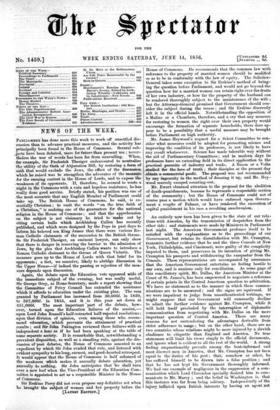NEW - S OF THE WEEK.
PARLIAMENT has done more this week to work off unsettled dis- cussion than to advance practical measures, and the activity has
principally been found in the House of Commons. Several sub- jects have been debated, more for future than present use ; never- theless the war of words has been far from unavailing. When, for example, Sir Frederick Thesiger endeavoured to neutralize the utility of the Oath of Abjuration Bill, by restoring a form of oath that would exclude the Jews, the effect of the discussion which he raised was to strengthen the advocates of the measure for the ensuing contest in the House of Lords, and to expose the .weakness of its opponents. If, therefore, he seemed to waste a night in the Commons with, a vain and hopeless resistance, he has really done good service. Briefly stated, his position was one of the most eccentric that any English Member of Parliament could take up. The British House of Commons, he said, is es- sentially Christian ; to omit the words " on the true faith of a Christian," is undoing one of the guarantees for the national religion in the House of Commons ; and that the apprehension on the subject is not visionary he tried to make out by citing certain bulls which Archbishop Cullen has recently published, and which were designed by the Pope in past days to inform his beloved son Ring James that there were various Ro- man Catholic claimants of the succession to the British throne. So Sir Frederick Thesiger, an eminent lawyer, can only show that there is danger in removing the barrier to the admission of Jews, by the plea that Archbishop Cullen wants to introduce a .Roman Catholic claimant to the throne of Queen Victoria. The measure goes up to the House of Lords with that brief for its opponents ; a fact, we oonoeive, likely to abridge discussion in the Upper House—if indeed the passing or rejection of the mea- sure depends upon discussion.
Again, the debate upon the Education vote appeared wide of the immediate subject of the evening, but was really useful.
Sir George Grey, as Home Secretary, made a report showing that the Committee of Privy Council has extended the assistance which it affords to education under the existing plan. The sum granted by Parliament has increased from 30,0001. in 1839, to 397,0001. in 1855, and it is this year set down at 451,0001. The most important 'part of the debate, how-
ever, turned upon the Education failures of the session,—
upon Lord John Russell's half-retracted half-rejected resolutions ; upon that division of opinion, even among those who recom- mend education, which prevents the attainment of practical results ; and Sir John Pakington reviewed these failures with as independent a tone as if he had been speaking at the table of some separate society. It is remarkable that, notwithstanding a prevalent disposition, as well as a standing rule, against the dis- cussion of past debates, the House of. Commons assented to an expedient by which Sir John evaded that rule, and listened with evident sympathy to his long, earnest, and good-hearted retrospect. It would appear that the House of Commons is half ashamed of the weakness which makes it annually debate education, yet Annually do nothing. Sir John anticipates that Aire shall turn over a new leaf when the Vice-President of the Education Com- mittee is appointed to act as a responsible Minister in the House of Commons.
Sir Erskine Perry did not even propose any definitive act when he brought the subject of woman and her property before the [LATEST EDITION.]
House of Commons. He recommends that the common law with reference to the property of married women should be modified so as to be in conformity with the law of equity. The Solicitor- General takes some exception to Sir Erskine's method of bring- ing the question before Parliament, and would not go beyond the question how far a married woman can retain right over the fruits of her own industry, or how far the property of the husband can be rendered thoroughly subject to the maintenance of the wife ; but the Attorney-General promised that Government should con- sider the subject during the recess ; and Sir Erskine discreetly left it in the official hands. Notwithstanding the opposition of a Mali= or a Chambers, therefore, and a cry that any measure for restoring to women the right over their own property would encourage the formation of separate households, there does ap- pear to be a possibility that a useful measure may be brought before Parliament on high authority.
Mr. James Heywood's request for a Select Committee to con- sider what measures could be adopted for promoting science and improving the condition of its professors, is not likely to have any result whatsoever. Science has made tolerable way without the aid of Parliamentary Committees ; and in modern days its professors have an extending field in its direct application to the practical pursuits of industry and trade. A Bacon or a Volta studied for the love of truth ; their disciples at the present, day obtain a commercial profit. The proposal was not recommended by any ingenuity in the method of dressing it up, and,Mr. Hey- wood scarcely escaped counting-out..
Mr. Ewart obtained attention to the proposal for the abolition of death-punishments, because he represents a respectable section of the community ; but the House of Commons could not of course pass a motion which would have enforced upon Govern- ment a respite of Palmer, or have rendered. the execution of capital punishment in his case, a revolting anachronism. .


























